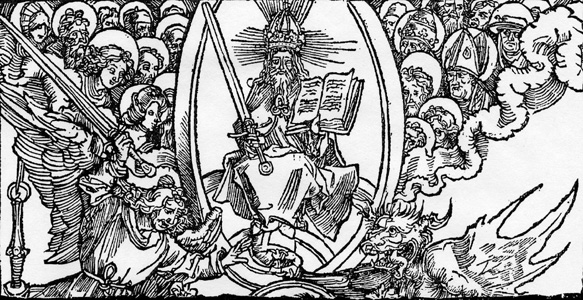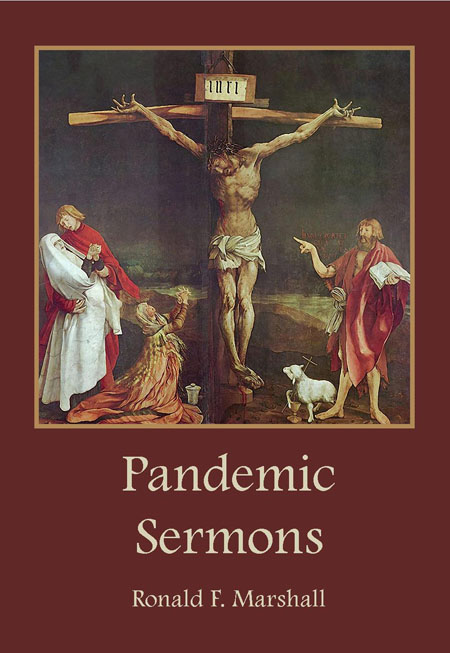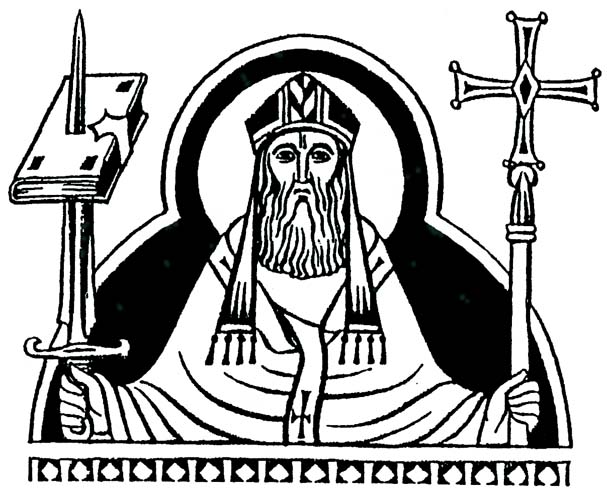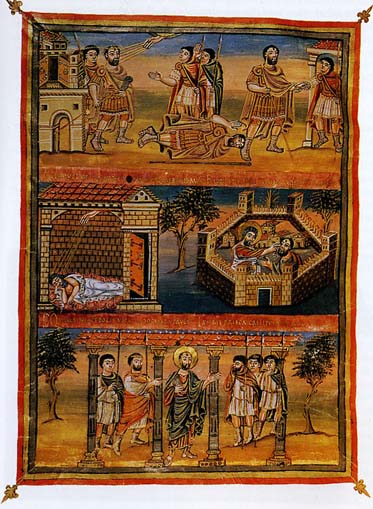|

For
Christians Only
By
The Rev. Ronald F. Marshall
First
Lutheran Church of West Seattle,
WA
February
2005
1. Only Christians Go to Heaven.
The Bible says there is salvation in "no other name" than that
of Christ Jesus (Acts 4.12). It teaches that if we don't believe in
Christ and obey him, "God's wrath rests upon us" (John 3.36).
This wrath brings the horrors of "eternal destruction and exclusion
from the presence of the Lord" (2 Thessalonians 1.9; Matthew 25.46)
in a "place of torment" (Luke 16.28). In this "outer
darkness" there will be "weeping and gnashing of teeth"
(Matthew 25.30). It surely won’t be a place to go to party with all
our rebellious and carefree friends.
Only belief in Christ can save us from this torment because he
alone brings us the grace of God the Father (John 14.6). So if we love
Christ Jesus, the Father will then love us and save us (John 14.21).
This is because Jesus dies for us (John 10.17) and offers up his life as
a sacrifice for sin to the Father (Ephesians 5.2). No one else can do
this for us (1 Timothy 2.5; Hebrews 9.26). He is the pure sacrifice (1
Peter 1.19). His death pays the penalty for our sin (2 Corinthians 5.20;
Colossians 2.14) and makes peace with God (Romans 5.1; Colossians 1.20).
When we accept this sacrifice and entrust our well-being to Christ our
Lord (Romans 3.25, 6.22, 10.9), we are saved. Otherwise, we are lost (1
John 5.10-12). So salvation comes only "through faith"
(Ephesians 2.8).
2. Only a Few Believers.
How many believe this? Jesus hoped at least some would (Luke 18.8; 1
Peter 5.18). He knew it was "offensive" and that most would
cast it aside (Matthew 11.6; John 6.61). This was largely because it was
based on his gruesome, agonizing, repulsive death (John 3.14; 12.32). So
only a "few" would end up believing (Matthew 7.14, 22.14).
Just a "remnant" would take it to heart (Romans 9.27). And
even they would only go kicking and screaming – if you will (Romans
9.16-18; Acts 9.3-9; 14.22; Romans 6.4). Even among those who say they
are Christians, many actually are not – Luther estimated upwards to
90% are phonies (LW 23:398-400)! And this small number with its terrible
consequences makes quite clear the "severity of God" (Romans
11.22; Hebrews 10.29). Oh, what a "fearful thing it is to fall into
the hands of the living God" (Hebrews 10.31). Indeed, God Almighty
is to be feared (Matthew 10.28).
3. Scared
Away By Suffering. Christianity – when first believed – appears
to be filled with joy (Luke 2.10 vs. Luke 12.49-53). But when we realize
that suffering with Christ is also required (1 Peter 4.13; Romans 8.17;
Matthew 16.24), we fall away (Matthew 13.21; Galatians 1.6). This
suffering includes being vilified for Christian truths (2 Timothy 4.1-5;
1 Corinthians 1.18). Luther called this contestable, unpopular truth, aspra veritas or "rough truth" (LW 11:58) and even
something "absurd" (LW 16:183). Most don't want the
embarrassment of this. All we want from Christianity is a "belly
sermon" that will "enrich" us in worldly terms (LW
23:5,11). So if Christianity were free of suffering, many more would
sign-up. But it isn't, so only a few love Jesus with a "love
undying" (Ephesians 6.23). These are called the foolish ones (1
Corinthians 4.10-13).
True salvation only comes with "fear and trembling"
(Philippians 2.12). So the "Christian life is nothing else than....
incessantly... purging out whatever pertains to the old Adam [who is]
irascible, spiteful, envious, unchaste, greedy, lazy, proud... and
unbelieving." Without this "earnest attack on the old
man," our faith is "hollow" (The
Book of Concord, p. 445; LW 26:269). This is because the freedom
faith brings (2 Corinthians 3.17) doesn't belong to the flesh. It's only
in our hearts – unseating the guilt for our sinfulness. So the battle
must rage. The hammer of God's Law must strike us hard and repeatedly
(Jeremiah 23.29; LW 26:310). For "the Law has dominion over the
flesh, but the promise [of the Gospel] reigns sweetly in the
conscience" (LW 26:301).
4. Historic,
Biblical Salvation Affirmed.
In the Lutheran Confessions (1580) these Biblical teachings are
affirmed. They teach that Christ will "give eternal life and
everlasting joy" to those who believe in him, but "hell and
eternal punishment" to those who don't (The
Book of Concord, Tappert ed., p. 38, AC 17:3). Faith in Christ alone
saves us from this doom. For he alone "has snatched us poor lost
creatures from the jaws of hell... and restored us to the Father's favor
and grace,.... not with silver and gold, but with his own precious
blood," through which he has made "satisfaction" to God
by paying what we "owed" (The
Book of Concord, p. 414, LC 2:30-31).
The Roman Catholics however aren't as clear about this. In the Catechism of the Catholic Church, (1999), it says Jesus Christ
"alone brings salvation" (§432), but under special
circumstances one can be saved if he "does the will of God in
accordance with his own understanding of it" (§1260). The same
goes for the August 6, 2000 Papal Declaration Dominus
Iesus. It says that the
Church
of
Christ
is not "one way of salvation alongside... other religions" (§21),
but that in other religions "salvation in Christ is accessible
by... grace" when Christ "enlightens them in a way which is
accommodated to their spiritual and material situation" (§20).
This is a too costly qualification!
5. Overhauling Heaven.
In the face of historic, Biblical salvation, there remain Christians
today asking for a change.
They want the church to say that all good people go to heaven whether
they believe in Jesus or not. Some are even asking that everybody be
allowed to go. This is because the wicked need mercy and purging too.
Besides, being tortured for
eternity is much too long. These views are carefully, clearly and
briefly presented of late by Jacques Ellul in chapter 14 of What
I Believe (1989), by Richard John Neuhaus in chapter 2 of Death
on a Friday Afternoon: Meditations on the Last Words of Jesus from the
Cross (2000), and by Bishop Kallistos Ware in chapter 12 of The Inner Kingdom (2000). This requested change is called
Universalism [Universal Salvation?
The Current Debate (2004), eds. Robin A. Perry & Christopher H.
Partridge].
It is clearly gentler and kinder. Damnation makes Christianity
morally and intellectually untenable. The renowned Sir Bertrand Russell
thought damnation was "a doctrine of cruelty" that discredited
Christianity [Why I am Not a
Christian (1957) p. 18]. Universalism makes more sense by being
closer to how ordinary punishments work. Only the guilty are punished
and for no longer than a lifetime. It also picks up on those few verses
that seem to be universalistic (1 Corinthians 15.22; 1 Peter 4.6; 1
Timothy 2.4).
Finally it also honors the first covenant God made with the Jews,
thereby providing for their salvation apart from belief in Jesus as Lord
and God (pace John 20.28). The
American Catholic Bishops have submitted a draft statement on this
point, declaring an end to any plea for "the conversion of the
Jews," simply because in Judaism they "already dwell in a
saving covenant with God" ["Reflections on Covenant and
Mission
," Origins (September 5,
2002) pp. 220, 221].
6. Using
Wrong Presuppositions. Opening up heaven to more than Christians is
certainly kind-hearted and open-minded. But that doesn’t justify it.
Universalism errs the way it begins. It assumes kindness and generosity
are supreme. But for Christianity this is not so. Other qualities matter
more. Distress is one (Romans 8.18). So are punishments (Hebrews 12.10),
suffering (Romans 5.3), loss (Matthew 16.23), trials (1 Peter 1.6),
tribulation (Acts 14.22) and sorrow (John 16.20). This surprising view
is derived from the centrality of Christ's crucifixion (John 12.32; 1
Corinthians 2.2). Following that conviction, the true "treasury of
Christ" is not the absence of conflict and pain but the
"impositions and obligations of punishments" (LW 31:227).
Without these prior, superior qualities in place, Christian love
– that is kindness and generosity – degenerates into "stupid
affection" (LW 13:153). So faith and truth must always be placed
high above love in Christianity (LW 26:103; 27:38; 23:330; 1:122).
Illustrative of this most contentious point, note the lack of affection
for the young rich man in Mark 10.22-23, for the damned rich man in Luke
16.24-31, for the lying Ananias and Sapphira in Acts 5.1-13, and for
idolaters in Deuteronomy 13.8.
7. An Old Heresy.
Universalism is not new. Early on Origen of Alexandria (185-254) in his
famous treatise On First
Principles, argued for Universalism only to be condemned in 553
because of it in
Constantinople
at the Fifth Ecumenical Council. He believed in Universalism because
“from [the original indestructible unity of God and all spiritual
essence] it necessarily follows that the created spirit after fall,
error, and sin must ever return to its origin, to being in God" [A.
von Harnack, History of Dogma (1900) II:346]. This necessary restoration of all
people to God is because there are no deep and durable fissures in the
world that would keep the condemned from enjoying God's blessings
forever. So for Origen this indestructible unity must result in
Universalism.
This idea comes more from Neoplatonic philosophy than from
Biblical testimony. In the Bible we see the fissure between light and
darkness (Luke 1.79) replicated permanently in that "great fixed
chasm" between heaven and hell (Luke 16.26). For this reason
Origen's view is wrong albeit wistful. It is not true that "in the
end all the spirits in heaven and earth, nay, even the demons, are
purified and brought back to God." But Origen knew the church would
never go along with this. So he called it an "esoteric"
doctrine and concluded: "For the common man it is sufficient to
know that the sinner is punished," albeit only for a short while (Harnack,
II:378). Origen may then well have agreed with Christian Gottlieb Barth
(1799-1862): "Anyone who does not believe in the universal
restoration is an ox, but anyone who teaches it is an ass" [Jaroslav
Pelikan, The Melody of Theology (1988) p. 4.].
Well before Origen, God's people also challenged his fairness. In
Ezekiel 18.25 we read: "Yet you say, 'The way of the Lord is not
just.' Hear now, O house of
Israel
: Is my way not just? Is it not your ways that are not just?'"
Similar lines are in Romans 3.5 and 9.14 with the same results. We don't
know enough nor are we good enough to improve upon God's ways among us.
8. Not All Are Saved in
the Bible. Universalists argue that Acts 4.12 is about physical
healings and not eternal salvation. They say that the word
"salvation" can also mean healing. They also note that Acts
4.12 builds on the healing of the lame man in Acts 3.7. So the whole
passage is "far removed from whether there is any 'saving'
revelation of God outside Jesus" [John A. T. Robinson, Truth
Is Two-Eyed (1979) p. 105]. But this is not so for two reasons.
First there is still the exaltation of Christ even if it is only a
physical healing. And secondly the two – healing and saving –
actually go together: the lame man was healed because of his faith in Christ (Acts 3.13-21, 4.4).
Universalists also point to Bible verses that say all will be
saved, or all
Israel
at least will be saved (Romans 11.26). But this is not true. You cannot
pass over faith when it comes to salvation. So, as Luther pointed out,
these passages only mean that "God gives both [the ungodly and the
godly] the light of the sun,.... but He does not save the
faithless" (LW 28:262; 25:431). There is no salvation without faith
in Christ, for "God himself cannot give heaven to him who does not
believe" (LW 32:76). So regarding the salvation of the Jews, that
too must come only through faith in Christ Jesus. For "the Old and
New Covenants are not two... equal, parallel paths to salvation"
[Roy H. Schoeman, Salvation is
From the Jews (2003) p. 353].
God therefore doesn't save groups of people all together at once.
He saves people individually because of their faith in Christ Jesus.
Just as we must die by ourselves
– no one can do that for us, of course – no one else can believe for
us either (LW 51:70; 45:108). So there are no exemptions or
substitutions for individual believers believing. Jesus, remember,
praised the faith of an individual over that of an entire nation:
"Not even in
Israel
have I found such faith" (Matthew 8.10).
9. All Religions Aren't
Equal. We should not expect what Robley E. Whitson has called in his
book, The Coming Convergence of
World Religions (1971, 1992). The differences between Christianity
and other religions matters to Christians. Acts 14.15 tells followers of
other gods to "turn from those vain things to a living God."
What makes these other ways useless and vain? It’s that they
cannot give us everlasting life. Nothing more. For they may still have
limited, moral value for
Christians. Indeed, "we find in the religions an echo of God's
activity in all expressions of life because God has not left himself
without a witness among the nations (Acts 14.16-17), which means that
the reality of God and his revelation lie behind the religions of
humanity as anonymous mystery and hidden power" [Carl E. Braaten, No
Other Gospel: Christianity Among the World's Religions (1992) pp.
67-68]. So Christians, for instance, are authorized to work with other
religions on matters of "world peace, human rights, cultural
enrichment, religious tolerance and care for the earth" (Braaten,
p. 99).
Studying, then, the exotic naturalistic religions photographed
and described in Wade Davis' stunning book, Light
at the Edge of the World: A Journey Through the Realm of Vanishing
Cultures (2001) has its place. So does Martin Luther's help in
getting Theodor Bibliander's 1543 Latin translation of the Koran
published along with his preface for it even when he condemned Islam
itself (Word & World,
Spring 1996). Studying other religions doesn't mean there's salvation
to be found in them. Nevertheless it remains better to know them than
not. For ignorance isn’t bliss (1 Peter 2.15).
10. Boasting in Christ.
Just because there's no salvation outside of Christianity, it doesn't
mean Christians should be arrogant about it and ridicule other
religions. Humility instead is to mark our lives – not pomposity (1
Peter 5.5). "Do nothing from... conceit, but in humility count
others better than yourselves" (Philippians 2.3). Buddhists, for
instance, may be more devout than Christians. They may take their
religion more seriously. That should be acknowledged if true. Jesus
seemed to do so, urging "making friends" even with the
unrighteous ones (Luke 19.6).
Even so we must never be embarrassed or ashamed of Christ (Luke
9.26). He is the Lord and Savior. He is the only mediator (1 Timothy
2.5) and advocate we have (1 John 2.1). So in him we are to boast –
though never of ourselves too for
believing in him (Galatians 6.14). Whatever arrogance, then, we may
have, it cannot be for ourselves. It must rather be an "arrogance
of the Holy Spirit" (LW 24:118). This is an arrogance that gives
all the glory to God (1 Corinthians 10.31). It is right for Christians
to do just that.
11. Praying for
Unbelievers. We shouldn't castigate unbelievers. We shouldn't ever
gloat over their condemnation and coming misery. "Do not rejoice
when your enemy falls, and let not your heart be glad when he
stumbles" (Proverbs 24.17). Instead we should pray for their
redemption. We should pray that they may be saved even "contrary to
nature" (Romans 11.24).
Even though we know only a few will be saved and that it all
depends on God's mercy, we should nevertheless pray for unbelievers
(James 5.l6). But isn't this against God's will? No. He expects us to
have mercy on others as God himself has had mercy on us (Ephesians
4.32).
St. Paul
even was ready to give his salvation away to the damned that they might
be saved instead of him (Romans 9.3). So our prayer should be: “Have
mercy on those who do the devil's bidding. Crush their hearts and bring
them to repentance and faith in your dear Son, Christ Jesus, that they
may know the joy of your salvation. Nevertheless, thy will be done
(Matthew 26.39). Amen.”
This prayer is not limited to men, the wealthy and politically
free (Galatians 3.28). Neither is it limited to certain ethnic groups
(Acts 10.35; Matthew 28.19). Christ after all truly died for the sins of
the whole world (1 John 2.2; 1 Peter 2.24).
12. Shaming the Wise.
Believing in the unique salvation of Christ Jesus is not based on
plausibility (1 Corinthians 2.4). It isn't for the wise whom God has
shamed with his offensive word (1 Corinthians 1.27). It isn't a coherent
philosophy of life (Colossians 2.8). It’s rather based on heavenly
(Philippians 3.20) standards of possibility (Luke 1.37; 18.27) and
goodness (John 6.27). Intellectual respectability isn’t the right
measurement.
So rather than discussing God's salvation and assessing it, we
are to hear it and keep it (Luke 11.28). Any intervening interpretative
or evaluative stage in between the hearing and obeying is ruled out. We
are to take the message in like an infant does her mother’s milk (LW
16:93). No discussion, critique or revision. Just take it straight. In
this simple, primitive faith is power to be come children of God (John
1.12) – to be born from above (John 3.3). It turns us into new
creations (2 Corinthians 5.17). It makes us faithful unto death
(Revelation 2.10). Bickering about Christianity puts an end to this new
creation. And so we know why Jesus says he's not for the wise and
understanding (Matthew 11:25-27). If you can't take him in with a
childlike mind, you'll never believe in him (Matthew 18.3). This trust
is the life of the Spirit in Christ Jesus (1 Corinthians 2.13).
There is so much more about Christianity besides damnation that
is offensive. The list is nearly endless: Keep the old faith (Jude l.3),
A message without human origin (Galatians 1.12), I'd rather be dead
(Philippians 1.23), Virginal conception (Luke 1.35), Homosexual behavior
is wrong (Romans 1.27), I don't live my life (Galatians 2.20), Be
heavenly-minded (Colossians 3.2), Christ is better than anything
(Philippians 3.8), Blood relations aren't family (Mark 3.35), Rejoice
always (Philippians 4.4), Serving only God (Luke 4.8), I can do all
things (Philippians 4.13), Pray constantly (1 Thessalonians 5.17), Even
lustful looks are adultery (Matthew 5.28), Awards are bad (John 5.44),
Rejoice when hated (Luke 6.23), Care nothing about food or clothes
(Matthew 6.25), You must drink Jesus' blood (John 6.53), The tough way
is best (Matthew 7.14), The dead live (Luke 7.15), Pleasures are bad
(Luke 8.14), The sighted must be blinded (John 9.39), Let the dead bury
themselves (Luke 9.60), Threatened by wolves (Luke 10.3), Healing makes
things worse (Luke 11.26), Don't cry until bloodied (Hebrews 12.4),
Divided families are good (Luke 12.51), Hate yourself (John 12.25),
Renounce everything (Luke 14.33), Human praise is bad (Luke 16.15), Pick
up serpents (Mark 16.18), Deny yourself (Matthew 16.24), We are
worthless (Luke 17.10), Keep praying even when ignored (Luke 18.1), Face
your abuser alone (Matthew 18.15), Only God is good (Luke 18.19),
Marriage is only for one man and one woman (Matthew 19.5), Divorce is
bad (Matthew 19.9), Believe without evidence (John 20.29), The world is
evil (1 John 5.19), Many are called but few are chosen (Matthew 22.14),
etc.
So Luther was correct drawing his amazing conclusion: "Since
God is a just judge, we must love and laud his justice and rejoice in
God even when he miserably destroys the wicked in body and soul, for in
all this his lofty and unspeakable justice shines forth. Thus even hell
is no less full of good, the supreme good, than is heaven. The justice
of God is God himself and God is the highest good. Therefore, even as
his mercy, so must his justice or judgment be loved, praised, and
glorified above all things" (LW 42:156).
13. Only Jesus Knows His
Own. The fact that only Christians go to heaven doesn't mean we know who they are. So Christians can't declare who's in and who's
out. Christ will make that judgment in the end (John 5.22). Jesus knows
his own and they know him (John 10.27). Until the end the weeds grow up
with the wheat and who's whom will not be settled until the end (Matthew
13.41-43). None of us can perceive that intimate relationship between
Christ and redeemed sinners (1 Corinthians 2.11-12).
For a while we think we might know them by the fruits of their
lives (Matthew 7.16). But things change. People drift away from
salvation (Hebrews 2.1). Others come back into it (Luke 15.17). Only God
sees into our hearts and knows our final disposition (1 Samuel 16.7;
Matthew 15.8). He is the final judge – not us.
Many haven't been able to endure this uncertainty about each
other. So schemes have been devise. One of the most famous was that
"good works" were "indispensable as a sign of
election" [Max Weber, The
Protestant Ethic and the Spirit of Capitalism, trans. Talcott
Parsons (1920, 1958) p. 115]. So people worked hard in order to prosper
and thereby prove their salvation – which of course was supposedly
granted freely to them through Christ Jesus. But because this scheme
jumped-the-gun and usurped Christ's place as judge, it was a failure
even though many relied on it anyway – and still do.
14. Making Faith Possible.
Why does God make it so difficult for us to believe? Why are we expected
to believe that so many are damned to hell? Doesn't damnation destroy
faith? No. It's actually the opposite.
If
God made good moral and intellectual sense he would be easily known and
understood. No risk would be required to believe in him – no venturing
out into what is unseen and only "hoped for" (Hebrews 11.1).
But faith requires such a risk. So God’s appearances upset us to test
us. Can we believe? His love looks like hate (Matthew 15.26-28). His
wisdom looks foolish and his power puny (1 Corinthians 1.23-25). In this
way he makes "room for faith." He creates a risk. Then we can
"believe him merciful when he saves so few." After all,
"if I could comprehend how... God can be merciful and just who
displays so much wrath and iniquity, there would be no need of
faith" (LW 33:62-63).
15. Untying the Knots.
Christians value simple explanations and straightforward statements (Galatains
2.14; 1 Corinthians 14.8; 2 Corinthians 4.2; Ephesians 4.14; 2 Peter
1.20, 3.16). We think beating-around-the-bush is bad. So why is this
essay on heaven and hell so involved? Couldn't it have been shorter and
simpler? I think not.
Our situation is like that of the
Cambridge
University
philosopher, Ludwig Wittgenstein (1889-1951). He thought philosophy should be simple – all the while knowing that it simply
couldn't be. So he concluded: "Why is philosophy so complicated? It
ought, after all, to be completely
simple. – Philosophy unties the knots in our thinking, which we have
tangled up in an absurd way; but to do that, it must make movements
which are just as complicated as the knots.... The complexity of
philosophy is not in its matter, but in our tangled understanding"
[Philosophical Remarks (1964,
1975) p. 52].
If it were not for all our knotty confusions, we could have
simply sung these verses of Luther's hymn on Christ [Lutheran
Book of Worship (1978) No. 79] and left it at that:
To
his disciples spoke the Lord,
"Go
out to ev'ry nation,
And
bring to them the living Word
And
this my invitation:
Let
ev'ryone abandon sin
And
come in true contrition
To
be baptized, and thereby win
Full
pardon and remission,
And
heav'nly bliss inherit."
But
woe to those who cast aside
This
grace so freely given;
They
shall in sin and shame abide
And
to despair be driven.
For
born in sin, their works must fail,
Their
striving saves them never;
Their
pious acts do not avail,
And
they are lost forever,
Eternal death their portion.
|










